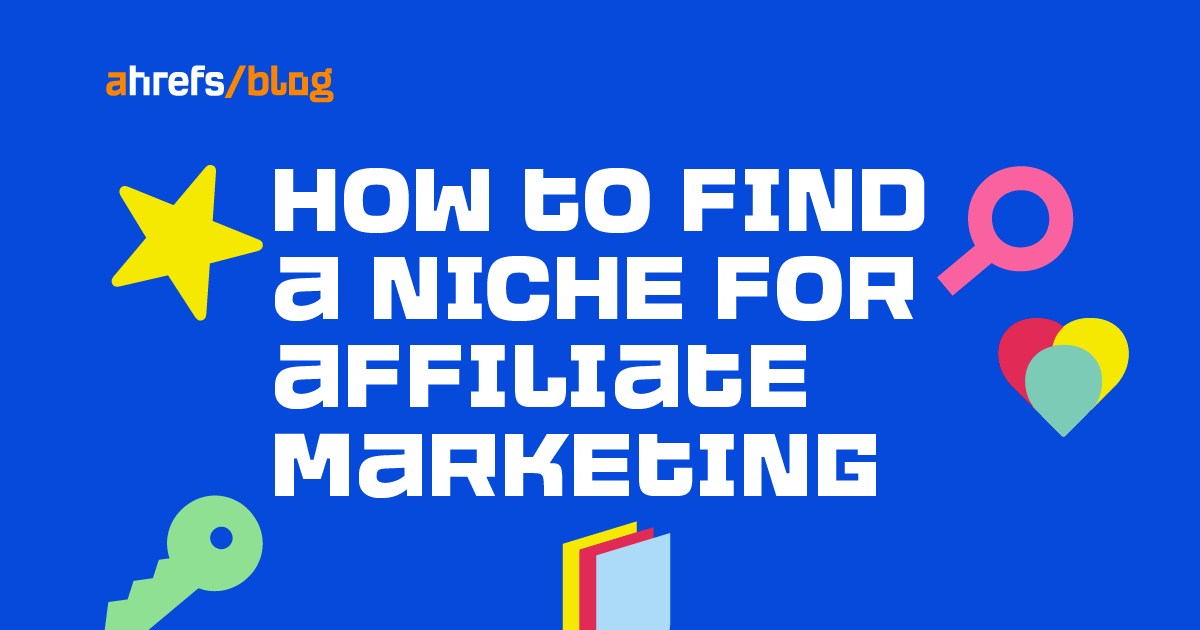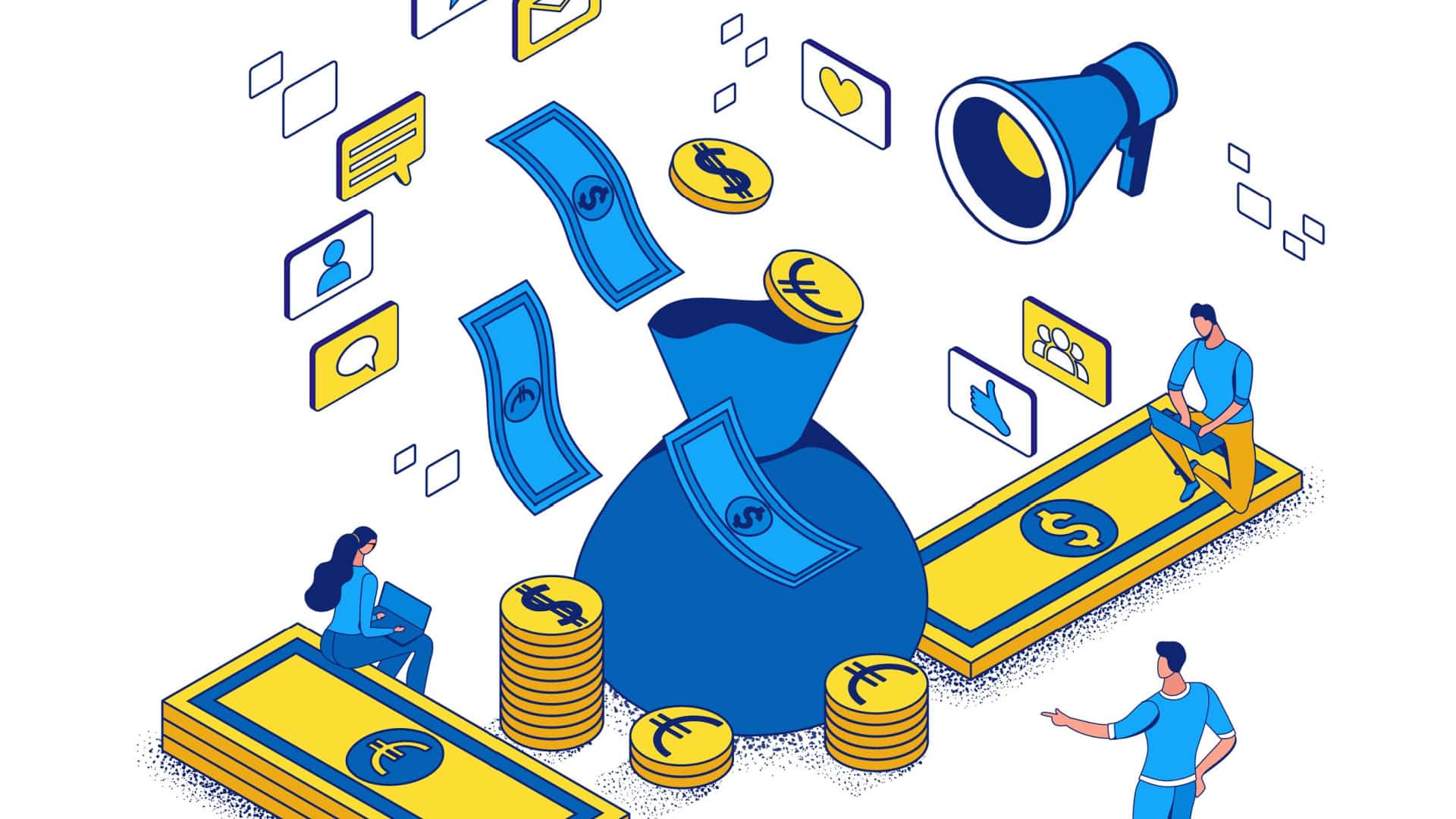When we were young, we all wanted to sit at the adult’s table. But we couldn’t, often, because of our behavior.
Growing up, we often thought we were cool, but we weren’t. Look back at your past. There are probably photos or things you did that you find questionable today.
This is exactly how we SEOs should be looking at our work. SEO has grown up a lot; we SEOs didn’t.
Our mindset is a problem when tackling challenges like needing a strong brand or satisfying users the most.
? What we do:
- Faking first-hand experience and looking for things we can leave out “because Google cannot measure that.”
- Buying (terrible) links (no one clicks), a practice that will be sketchy.
This is the wrong approach.
? What we should be doing:
- Proving our experience, expertise, authoritativeness and trustworthiness.
- Creating the best content possible that is worth linking to or mentioning.
To finally grow up, we have to look into the mirror. We have to change.
If you are pressed on time, here’s a quick rundown of what I suggest you should start doing today:
- Embrace change as an opportunity to grow by making yourself familiar with it and turn obstacles on their head.
- Do what is rational, logical and repeatable, study the Search Quality Rater Guidelines (SQRG) to understand what Google wants and invest in preparation, not prediction.
- Stop cheating or manipulating and start building something extraordinary. Start taking responsibility for your actions and stop blaming others for your failures. Save your energy to fight for positive outcomes, instead of wasting your energy on a negative candy rush.
- Communicate, understand and execute SEO the right way: As a growth engine, leading to limitless growth, not marginal improvements. Favor building over optimizing and fixing. Find your real competitive advantage and don’t buy into snake oil, cookie-cutter strategies or get-rich-quick schemes.
Disclaimer: This is not a purely tactical guide. My goal is to make you think. Motivate you to ask yourself tough questions and provide you with the necessary mindset to fill out the shoes of adolescence. If you get one good thought from this I’m more than happy.
Let’s get into the trenches: This is how we grow up!
Embrace change as an opportunity to grow
When we were children, we didn’t want to accept that change was inevitable. As we grow up, we realize it’s much easier to accept the world for what it is than to strive for what it should be.
“You don’t get to dictate the course of events. And the paradoxical reward for accepting reality’s constraints is that they no longer feel so constraining.”
– Oliver Burkeman, “Four Thousand Weeks”
The same should apply to our SEO mindset.
Change can be old tactics no longer working (like putting white text on a white background; I only mention this because some website owners still do this today) or new things appearing on the horizon, like generative AI.
Many of our SEO playbooks are outdated, and forces are pulling on us to change. Here are two examples:
We often don’t have a crawl budget problem, but an indexing problem
Indexing is becoming harder.
From what we know, the size of Google’s index seems to be more or less static (about 400 billion documents). Due to AI, we are:
- Producing more (good and bad) content.
- The bar for content quality has a new, higher baseline.
More content of a higher quality baseline vs. same index size = it’s harder to get indexed.
Google is allergic to technical issues and low-quality content.
Google’s fierce changes in ecommerce searches
Google is under pressure to become a shopping engine.
As a result, Google renovated the SERPs for commercial queries.
In 2023, Google started to push a new feature: product grids.
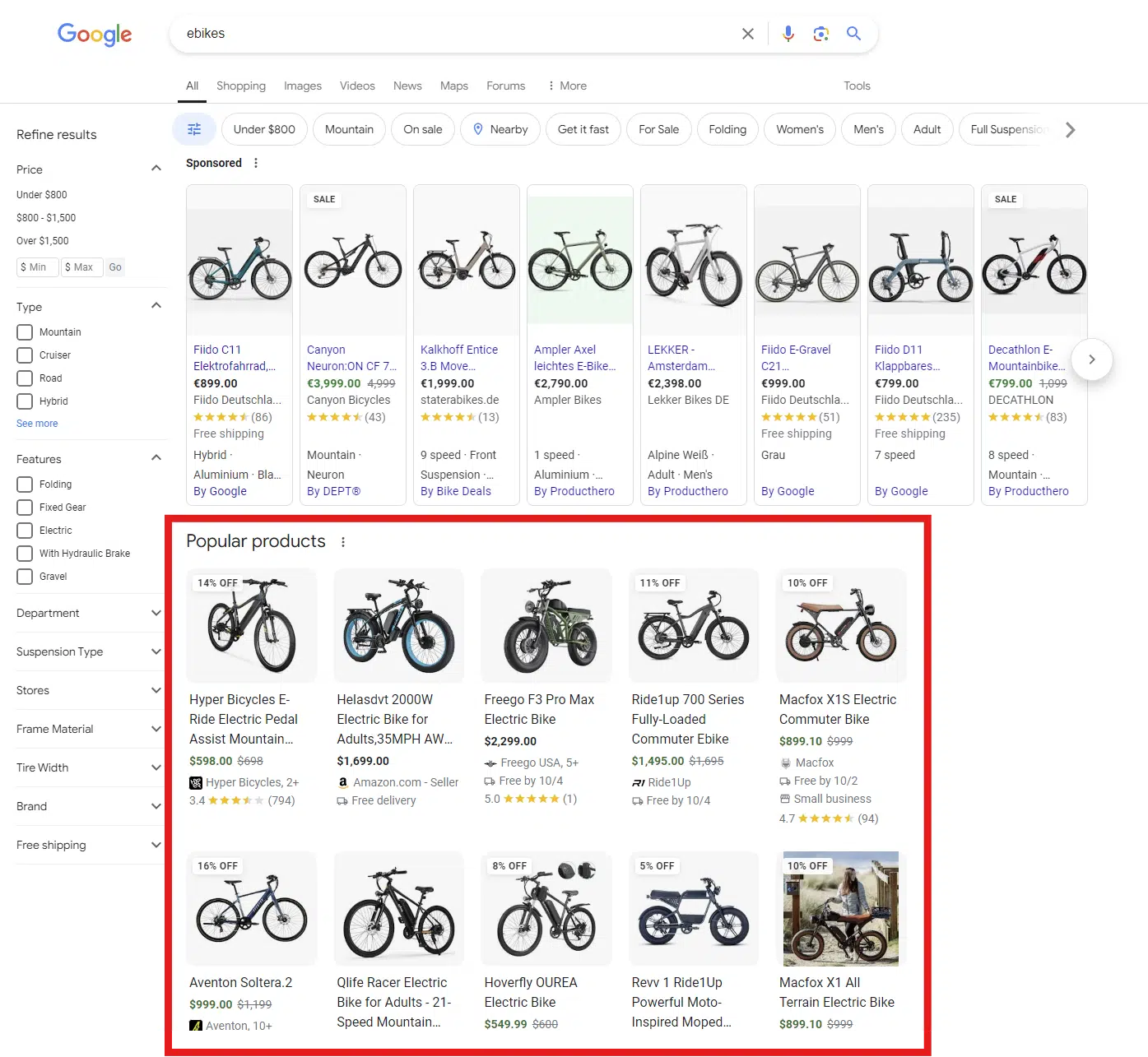
Categorized as “Merchant Listings,” these grids appear in commercial searches at Position 1 more and more often.
Based on my research for German SERPs, depending on the industry, product grids appear in position 1 between 15-45% of the time.
Thanks to some research done by Kevin Indig for the U.S., we know Google changed the rate of them appearing in Position 1 more often than in Position 3 around March 2024.
If your domain doesn’t play a role in product grids but your competitors do, you are in for a tough time.
The solution: Reframing problems as opportunities
Problems are what make life worth living. A problem can be reframed as a challenge or an opportunity. The cards are shuffled again, doors are opening up, and we are all new to these things.
Here’s a practical reframing example from a talk by Carrie Rose I heard this year:
- ? You are an ecommerce shop and lack authority in your niche
- ? The ranking domains are strong digital publishers, duh
- ? Instead of putting your head into the sand, you can put the obstacle on its head
- ? Don’t try to beat them, join them
- ? How? By giving them content they don’t have that is worth linking to
- ? Example: Internal searches showed an extreme increase in searches for White Vans
- ? They figured out faster than everyone else it was due to the series Squid Game on Netflix and pitched an article to news outlets
- ? Result: High-quality backlinks, traffic and additional revenue
Main takeaways:
- Embrace change, make yourself familiar with new developments, tools and technology (start with an hour a week).
- Strive to deliver “best in the world content,” not just “fine content.”
- Reframe problems into opportunities.
Double down on things that never change
On the one hand, we don’t want to change our behavior. On the other hand, our brain craves novelty, constantly looking for a dopamine hit.
I know it’s very easy to be sucked in. New trends like AI chatbots, AI phones, AI toothbrushes. All good. But you have to avoid the shiny toy syndrome and embrace what will always matter.
If you focus on the things that never change, you can predict the future.
There lies great power in what you can’t measure
It will always pay off to do what is logical and rational.
Google of 2004 is not Google of 2024. Just because Google cannot measure something right now doesn’t mean it cannot in the future. One example is having author bios and pages.
Due to the leak, we have our answers now, but having author bios and pages just because Google “wants” them didn’t make sense.
Things that cannot be measured are often underestimated and easily ignored. Fun fact: A metric is often more useful if it is harder to measure.
Prefer the repeatability in the present over the luck of the past
Luck is something positive that is not predictable. Repeatable means puzzle pieces falling into place like they used to. They are not the same.
In SEO, we love to look at what others did and you should. But focus on what is repeatable, not what was lucky.
You cannot follow in the footsteps of Amazon or HubSpot, as their operating conditions fundamentally changed. However, there are things worth learning from them.
- You can learn from HubSpot that it’s worth investing strategically in new channels/formats.
- You can learn from Amazon that it’s worth investing in what customers will always value: Good prices and fast delivery.
Do what is repeatable; don’t try to emulate what was lucky.
Some more things that will never change
To draw on the Amazon example, Google will always need users to be satisfied with their search product. At least as long as this is their biggest revenue source.
One of your goals, in this case, should always be to have “best in the world content,” not good content.
In the SQRG, Google tells us exactly what they want. They have been doing so for years:
- Have author pages when it makes sense for your target audience.
- Don’t just copy the content of others, as high content quality is signaled by effort and originality.
- Auto-generated content (think AI or any programmatic plays) has more obstacles in its way to being rated Highest in terms of page quality.
Make no mistake: The next update is coming. The next disruption of the SERPs you operate in is coming as well.
It’s much better to invest in preparation over prediction. What we can’t see coming hits us the hardest.
Main takeaways:
- Do what is rational and logical, even if you or Google can’t measure it (yet).
- Copy what is repeatable today, not what was lucky yesterday.
- Study the SQRG to see what Google wants.
- Invest in preparation, not prediction.
Get the newsletter search marketers rely on.
Stop manipulating, start taking responsibility
Do you remember that when you were a kid, you often tried to manipulate and cheat in games?
In Germany, there is a game called “Mensch ärger dich nicht,” which roughly translates to “man, don’t be angry.”
I took chances to roll the dice again because someone “distracted me,” for example. This also happens often in golf and is known as a “mulligan,” so you get a pass and can take another shot.
At times, SEOs are like children who don’t want to accept the rules, cheat when no one is looking and love to blame others for our failures.
Examples of SEO manipulation practices
SEO is a breeding ground for manipulative tactics, and everyone knows the good old tales. Here are a few classics and recent ones:
- Terminated agencies updating the disallow file, so the work of the new agency gets tanked
- Content stealing, like the SEO heist
- Purely AI-generated content is neither a competitive advantage nor a strategy. Even if it does work short-term, it is not something you can rely on in the future. We advocate investing in a long-term channel, but we are so greedy and in a hurry that we fall for get-rich-quick schemes like Gollum in his pursuit of his precious.
- Link buying, which sounds like exchanging drugs on a backyard
- In some countries this is not just against Google’s official guidelines, but even problematic due to the law (in Germany we have the “Wettbewerbsrecht” for example).
- Affiliate link spam
- Someone created thousands of domains, all just containing affiliate links to all kinds of ecommerce sites in Germany to earn a quick affiliate buck. This is literally a resource waste which makes the internet a huge garbage hole. Please stop.
- Here’s an example domain that got spammed with these affiliate domains:
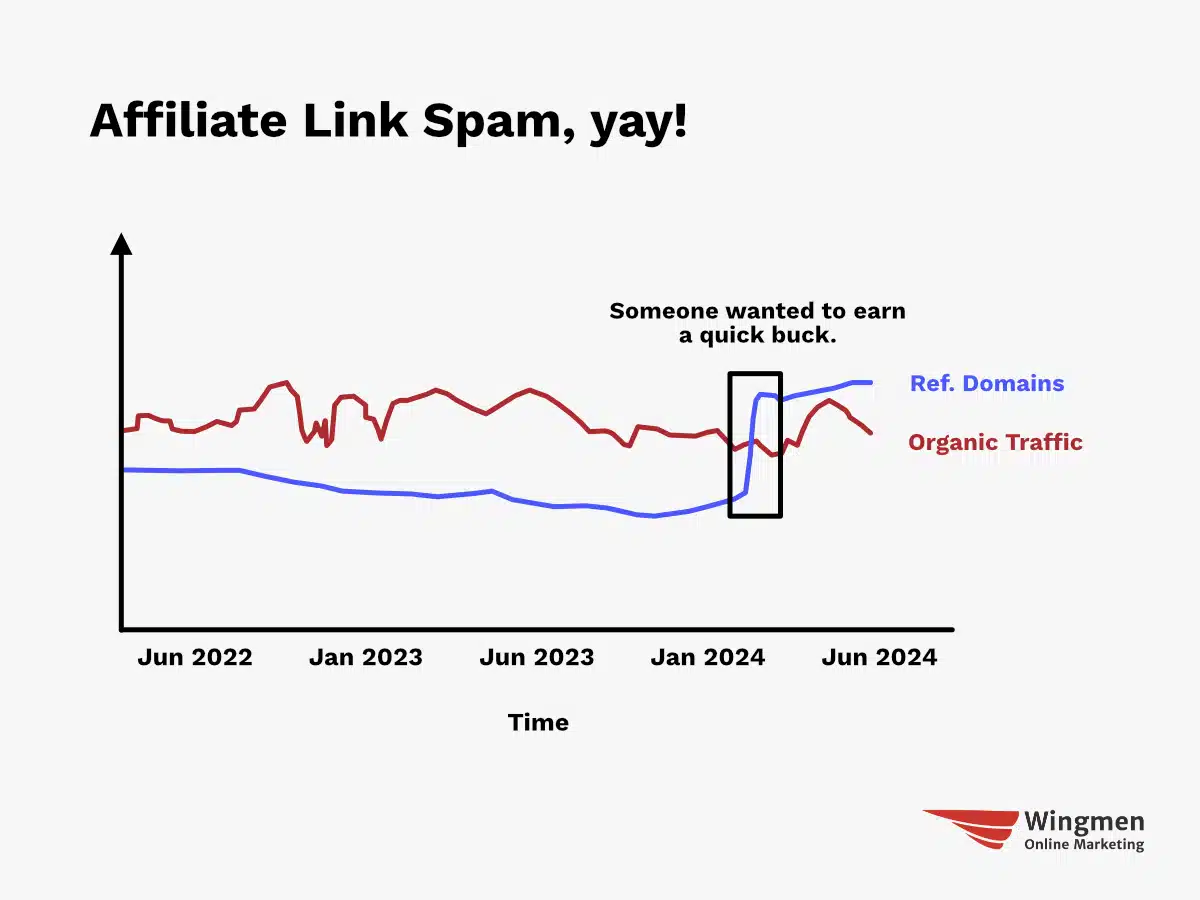
If you want to be taken seriously in SEO, don’t take shortcuts. Like Sonia Simone said, they take too long.
Why Google can’t tell us the truth
It’s easy to point fingers at Google. To call them liars and whatnot. Anyone with a clear mind has to understand that they cannot tell us exactly what is going on behind the curtain. If they did, at least a small group of SEO goblins would do everything in their power to ruin the game for everyone else.
SEO is the perfect example of the tragedy of commons.
“Each man is locked into a system that compels him to increase his herd without limit – in a world that is limited. Ruin is the destination toward which all men rush, each pursuing his own best interest in a society that believes in the freedom of the commons.”
– Garrett Hardin, “The Tragedy of the Commons”
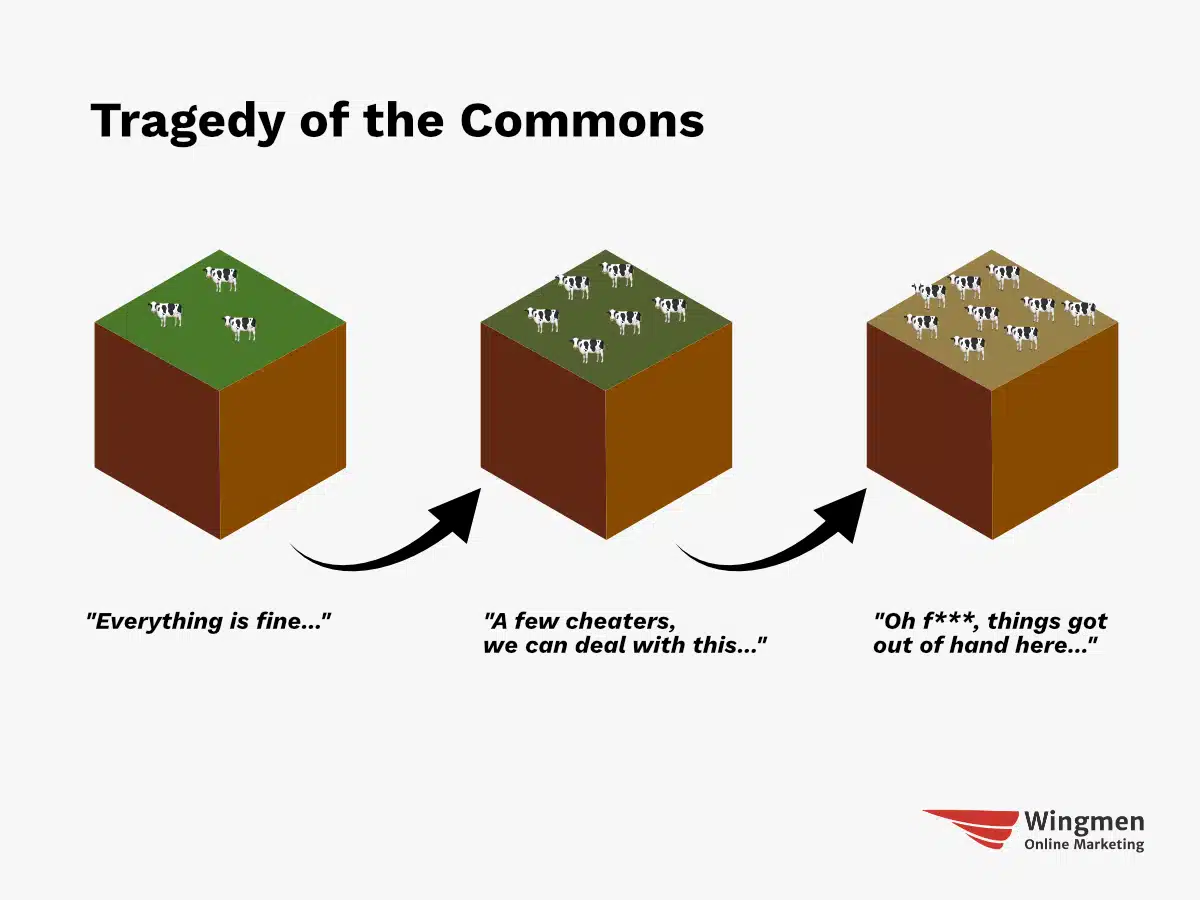
Some of us just can’t behave properly and break the system for everyone else.
Yet here we are, proud of engaging in our questionable get-rich-quick schemes, which no one would publicly endorse as employees of a real brand or big company.
Incentives beat intentions, unfortunately
Recently a guide on how to manipulate Reddit got a lot of traction. I understand what the intentions of the author were: Make things better. But I don’t agree with the approach and methods used to do it.
This is not an ad hominem case as this is not an individual problem.
Firstly, Google is blamed for creating incentives to spam Reddit. However, the article itself promoted incentives to do the same with the actual manual on a silver platter.
Publicly sharing the techniques to spam Reddit is promoting to spam Reddit even more, no matter how you put it. And it was never wise to fight fire with fire.
Also, people generally like Reddit and find the answers helpful. It’s no coincidence that they have these numbers:
I’m not saying there is no spam. But we don’t know the denominator here. If you seek a needle in a hay stack you will find one.
Secondly, Google is blamed 100% for the consequences of the Reddit spam. I don’t agree.
If you would look at the chain of responsibility through the eyes of several great philosophers, like Kant, Aristotle or Sartre, you would come to the conclusion that users taking advantage of the spam techniques are to blame first, then the platform (= Reddit) and then Google (= the middleman).
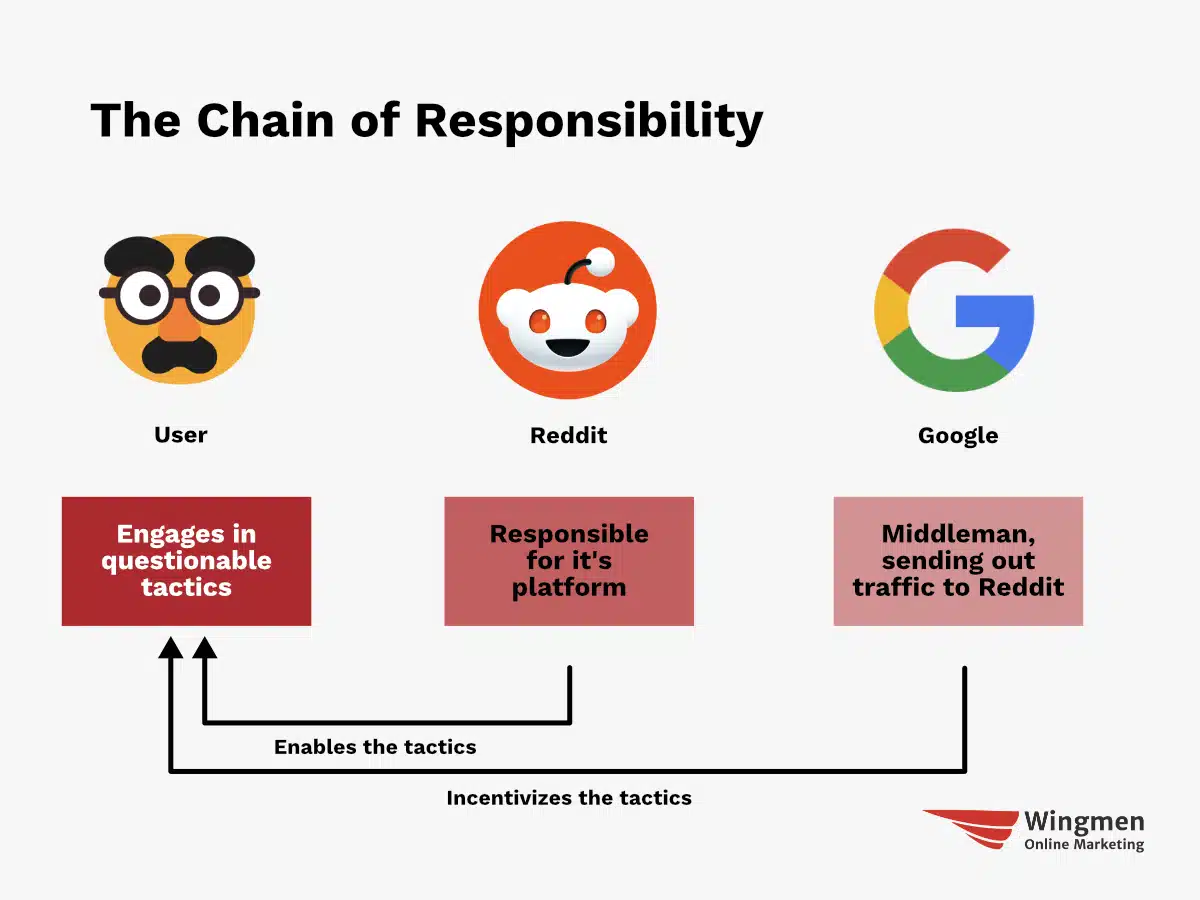
FYI: Others cheating doesn’t give you permission to do the same. Enabling and incentivizing these tactics is not a free ticket to cheat, either.
Look into the mirror: If spammers wouldn’t spam there would be no problem, so the root cause is our sometimes unbearable human nature.
The blame is (also) on us, not (just) the others
It’s more comfortable to blame others than to check on ourselves.
“Google got worse” is one on the trendiest topics of 2023 and 2024.
“Before Content Marketing was a thing, idiots did not publish content. You wouldn’t write encyclopedia articles without knowing anything. Now, we created a perverse incentive for any idiot to write about anything. We sit in a mountain of garbage.”
– Peep Laja, CEO, Wynter
What if Google didn’t get worse, but the ratio of good to bad content shifted?
If you fill a glass with more water (bad content) than wine (good content), the relative amount of wine in the glass decreases, even if the quality of the wine itself is good. It becomes harder to serve good content.
Google is responsible for their search results, but we are responsible for the mountains of garbage we produce.
A German study presumably claimed Google got worse. Their argument, only focusing on a small query subset in a specific niche, is insufficient to make such claims. It’s not even what they said but what people want to believe.
According to Statista, users are once again slightly more satisfied with Google search. And yes, according to the 286-pager on Google being a monopoly, Google tried to devaluate search quality to test the impact on revenue. But that test only lasted three months.
No one can predict if there wouldn’t be a negative impact on revenue in the long term, which is all that matters.
Let’s assume for a moment that this was true: Google got worse and our domains were demoted in favor of some big digital publishers. How would the confirmation of this bias actually help me?
It doesn’t.
Yes, I can and should be vocal about it. But a lot of time and energy goes into being negative. Negativity is like a candy rush. It distracts us, so you need to avoid it.
Author Ryan Holiday hit the nail on the head with this quote:
“In our own lives, we aren’t content to deal with things as they happen. We have to dive endlessly into what everything “means,” whether something is “fair” or not, what’s “behind” this or that and what everyone else is doing. Then we wonder why we don’t have the energy to actually deal with our problems.”
We need this energy wasted being negative in working on achieving positive outcomes, like crafting the best content out there or being the most helpful resource for our target audience.
Loopholes are risky short-term arbitrage opportunities, not long-term safe bets
A loophole is not a real competitive advantage, but a short-term arbitrage technique that brings a lot of risk with it. If revealed to the outside, there can be grave consequences.
I loved this from Alex Birkett recently LinkedIn:
“Shortcuts in SEO often bring a sugar high, but they also come with a crash. […] If you treat it like a get-rich-quick scheme, you’ll need to ‘fix the plumbing’ later.”
Some things, like reputation, are not worth risiking, no matter how much there is to gain. Think of Sports Illustrated for example.
Building a good reputation takes years. Setting it on fire can happen in seconds.
Main takeaways:
- Stop cheating or manipulating and start building something extraordinary.
- Start taking responsibility for your actions and stop blaming others for your failures.
- Save your energy to fight for positive outcomes, instead of wasting your energy on a negative candy rush.
Communicate und understand SEO as a growth engine, not as routine maintenance/polishing the edges
The grand finale: SEO has gotten a lot bigger.
Keeping SEO small and limited might be a way to avoid change. Could this be why many SEOs were reluctant to admit that Google uses user signals in their ranking algorithms?
Less change = SEO is smaller = more comfortable + less risky.
As outlined at the beginning, change is an opportunity. We walk into the fire of discomfort only to step out of it stronger, wiser and better.
SEO in 2024 is nothing like it was in 2004 or 2014. The fundamenta principles are the same, but we are driving a much different vehicle now with much more horsepower under the hood.
SEO is the wrong word for what we are actually doing
Digital publishers often get two-thirds or more of their traffic through SEO. A lot of companies rely heavily on organic traffic.
Some examples like Hardbacon had to file for bankruptcy as a result of the HCU and other updates. Some are or were on the cusp of it, like HouseFresh, Retro Dodo and Healthy Framework.
SEO stands for search engine optimization. But 70% or more of traffic share vs. other channels doesn’t sound like optimizing to me.
Optimization sounds like squeezing the last 5-10% out of what you already have. Limited and marginal.
The problem is that we all have different understandings of SEO, so we are not talking with each other but past each other.
To some, SEO means fixing mistakes/bugs. To others, myself included, SEO means (almost) limitless growth.
Fixing and optimizing is not enough:
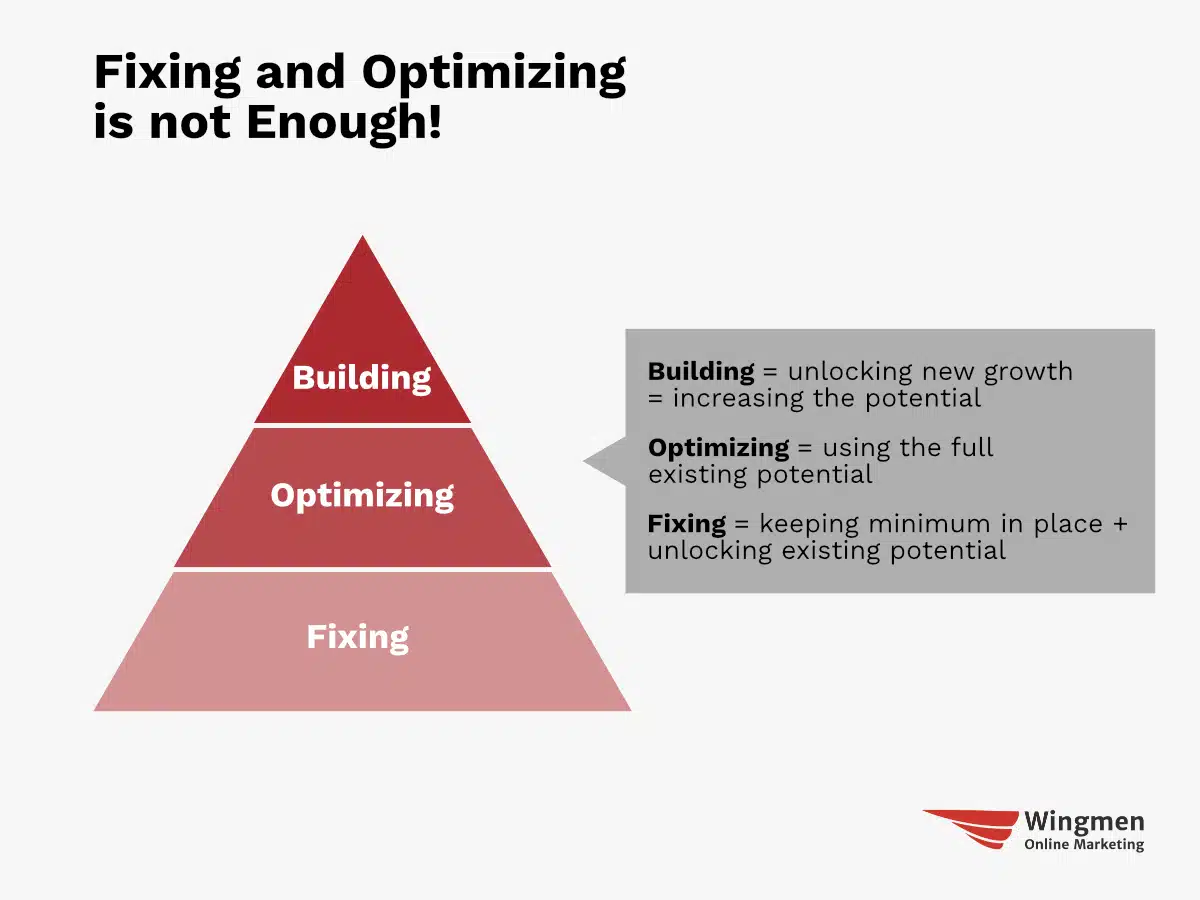
- ? Fixing = keeping the bare minimum in place and unlocking the existing potential.
- ? Optimizing = using the full existing potential.
- ? Building = unlocking new growth = increasing the potential.
To visualize the idea further, see the following graphic:
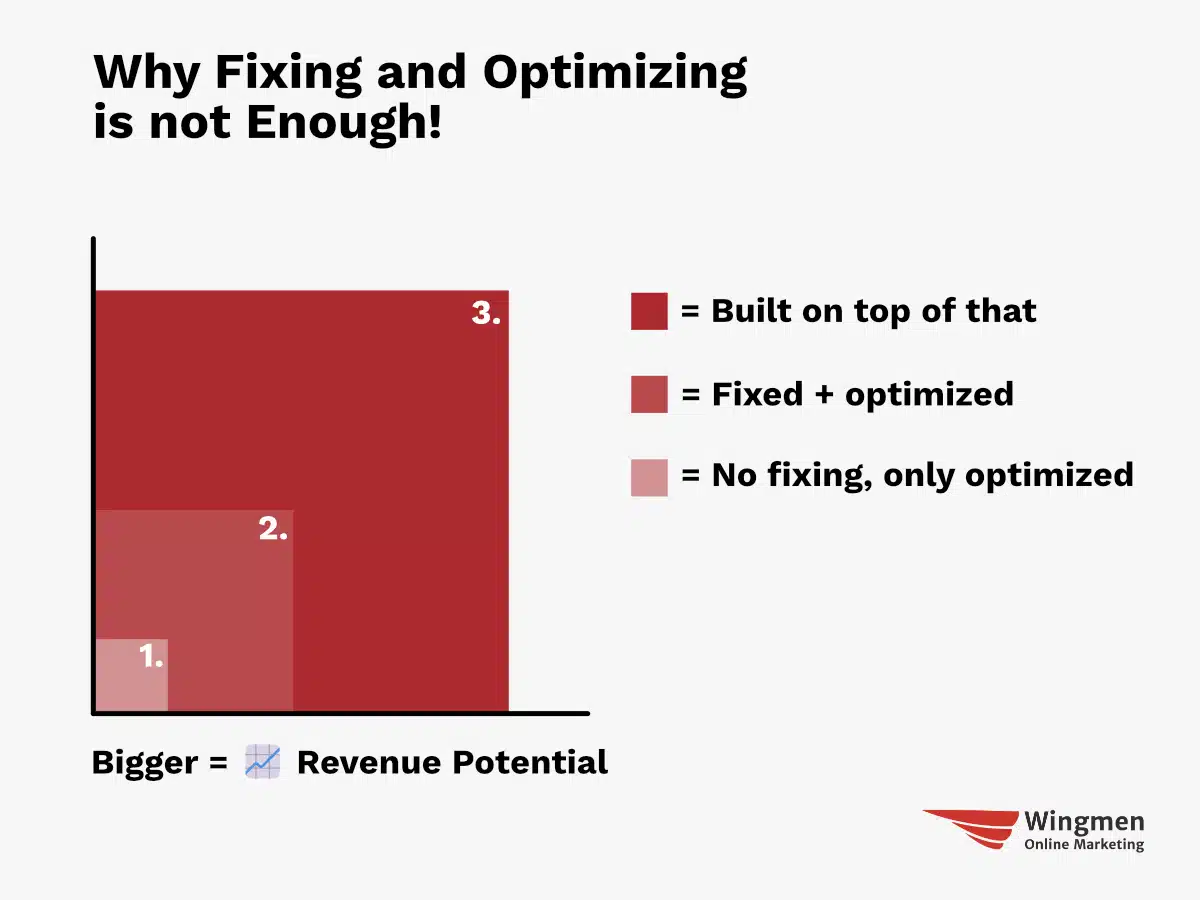
- Fixing is like you are repairing a broken window in your one-room apartment.
- Placing nicer furniture in that room is optimizing, you make it more appealing.
- The missing piece, then, is building new rooms if you actually want to live in a 10-room mansion.
Here are some things you need to communicate, understand and execute SEO as a growth engine:
- A business mindset, the right metrics and language a C-level member will understand.
- An updated SEO mindset, as ranking is not the end but a means to an end (= creating a high-value touchpoint with your target audience).
- The ability to play well with others, to make them embrace SEO, not despise it because you let them starve all the time by being greedy and only taking, never giving.
- Finding your (real) competitive advantage.
Finding your (real) competitive advantage
The last bullet point is especially important. It’s something that is missing quite often, from my experience.
Why should I buy from you? Why is your content the best in the world? The answer has to be the opposite of the “jumping the line” techniques criticized earlier.
The obvious question is how you get or find your real competitive advantage. It’s part of a good strategy. A strategy is always unique to a company.
In “Good Strategy, Bad Strategy,” Richard Rumelt says the kernel of a strategy involves three pieces:
- Diagnosis.
- Guiding policy.
- Coherent actions.
To find a competitive advantage, you need to ask the right questions, like:
- What are my unique abilities/assets?
- Which of these abilities/assets matter to my target audience?
- Which of these remaining abilities/assets differentiate me from my competitors?
A SWOT analysis can be a helpful tool here. An alternative to getting started is to list all the abilities and assets that make your brand you and then answer the last two questions.
Examples of abilities or assets could be that you:
- Have a higher editorial output (quantity/quality).
- Employ SMEs in several fields, while others only cover one.
- Are uniquely fast in execution in relation to your company size.
- Have proprietary data that you can use for original research and data journalism.
- Are the manufacturer of a product (= having technical knowledge others don’t have).
Main takeaways:
- SEO is not just “a channel” it’s often the growth engine for most companies.
- Communicate it the right way: Limitless growth > marginal improvements.
- Favor building than optimizing and fixing.
- Come up with a unique competitive advantage that you can leverage in your SEO strategy.
We have work to do
I hope a lot of what I said is something you heard at least once already. But like Christian Morgenstern said (translation by me):
“Sometimes you see something 100 or 1,000 times until you really see it for the first time.”
- We don’t want to change. Change is inevitable, though.
- We don’t always learn from the things that never change. But they let us predict the future.
- We like to skip the line and to go faster than is actually possible. Too fast often means fragile. You don’t want your SEO to be fragile, but to be unbreakable.
- We want it as easy as possible. Some things, however, are not easy. Like author James Clear said, “The cheat code is the work you’re avoiding.”
We have work to do.
Contributing authors are invited to create content for Search Engine Land and are chosen for their expertise and contribution to the search community. Our contributors work under the oversight of the editorial staff and contributions are checked for quality and relevance to our readers. The opinions they express are their own.

